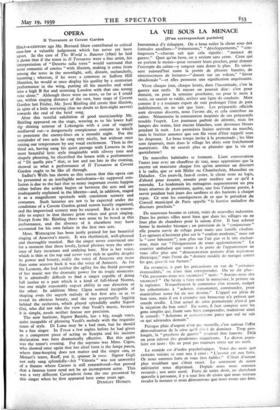OPERA
II Trovatore at Covent Garden HALF-A-CENTURY ago Mr. Bernard Shaw contributed to critical case-law a valuable judgement which has never yet been upset. In the case of The World v. Rawner (189o) he laid it down that if the tenor in Ii Trovatore were a fine artist, his interpretation of " Desert° sulla terra" would surround that most romantic of entries "with illusion, making it come from among the trees in the moonlight, soft, distant, melancholy, haunting.; whereas, if he were a common or Saffron Hill Mantic°, he would at once display his quality by a stentorian performance in the wing, putting all his muscles and wind into a high B flat and storming London with that one wrong note alone." Although there were no trees, so far as I could see, within singing distance of the vast, bare stage of Covent Garden last Friday, Mr. Jussi Bjorling did create that illusion, in spite of a little wavering (due no doubt to first-night nerves) towards the end of the brief song.
After this tasteful exhibition of good musicianship Mr. Bjorling appeared on the stage, wearing as to his lower half the shining armour of Lohengrin with a coat of vaguely mediaeval cut—a dangerously conspicuous costume in which to penetrate the enemy-lines on a moonlit night. For the remainder of two acts he sang very nicely, but without once raising our temperature by any vocal excitement. Then in the third act, having sung his quiet passage with Leonora in the most beautiful lyric style imaginable with silvery tone and shapely phrasing, he electrified the house with a performance of "Di quella pira " that, at last and too late in the evening, showed us what a performance of Ii Trovatore at Covent Garden ought to be like all through.
Sadler's Wells has shown us this season that this opera can be presented as an intelligible melodrama—its supposed con- fusion is due to the fact that so many important events happen either before the action begins or between the acts and are inadequately explained in the libretto—and, in addition, staged it as a magnificent spectacle with consistent scenery and costumes. Such luxuries are not to be expected under the conditions of a Covent Garden grand season hastily organised, and the improvised scenery may be excused. But it is reason- able to expect in that theatre great voices and great singing. Except from Mr. Bjorling there was none to be heard at this performance, and the absence of it elsewhere may have accounted for his own failure in the first two acts.
Mme. Wettergren has been justly praised for her beautiful singing of Azucena's music. It was rhythmical, well-phrased and thoroughly musical. But the singer never convinced one for a moment that these lovely, lyrical phrases were the utter- ance of fury incarnate and undying hate. Nor is her voice, which is thin at the top and never very rich in quality despite its power and beauty, really the voice of Azucena any more than some seasons back it was the voice of Anuteris. As for the Leonora, she had neither the agility for the florid passages of her music not the dramatic power for its tragic moments. It is admittedly difficult to find a singer capable of doing full justice to a part which is a kind of full-blood Norma, but one might reasonably expect ability in one direction or the other. In addition Mme. Cigna seemed incapable of shaping even the superb melody of her first aria so as to reveal its obvious beauty, and she was perpetually lagging behind the orchestra, which played splendidly under Signor Gui, who did not take the view that Verdi's music, because it is simple, needs neither finesse nor precision.
The new baritone, Signor Basiola, has a big, rough voice, quite incapable of phrasing Verdi's melody with the requisite sense of style. Di Luna may be a bad man, but he should be a fine singer. In Tosca a few nights before he had given us a competent piece of acting as Scarpia and his incisive declaration was here dramatically effective. But this again was the tenor's evening. For the soprano was Mme. Cigna, who showed once again that her chief forte is the lunga pausa, where time-keeping does not matter and the singer cane as Mozart's tenor, Raaff, put it, spianar la voce. Signor Gigli not only sang splendidly—his " Vittotia " was not unworthy of a theatre where Caruso is still remembered—but proved that a famous tenor need not be an incompetent actor. This was a very different Cavaradossi from the one presented by this singer when he first appeared here some years ago.
DYNELEY HUSSEY. DYNELEY HUSSEY.


















































 Previous page
Previous page